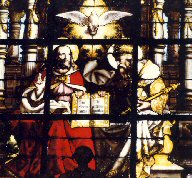 New Surprise – There is not one Personality we
call God, but a trinity of three distinct Divine Personalities in one Godhead –
God the Father, God the Son, and God the Holy Spirit.
New Surprise – There is not one Personality we
call God, but a trinity of three distinct Divine Personalities in one Godhead –
God the Father, God the Son, and God the Holy Spirit.
Our Savior, My Redeemer-C
Working
Definitions
Savior – The one who brings about the result.
Redeemer – The person who pays the price to bring about the result.
STEP THREE
JESUS CHRIST - MY REDEEMER
It is possible that everyone can win the prize (eternal happiness with God) . . . , but to win it we must do what we have been told will win it . . . . doing things in charity and love for others out of love for God. The model for both is found in the person of Christ who paid the price of our redemption by offering himself to his Father as a redeeming victim on the cross.
What Does God Expect Of Me?
First of all – We must discover the reasons why we do things. Actions motivated by love for God find expression through serving those he created. It should focus on helping others. Why should I lessen the “I” of myself, and substitute the him, her, and the others. Why? . . . for the honor and glory of the God who created us all! Realize that just as Jesus Christ took on human nature, dwelt among us, and established his church to minister to all God’s people, we continue the mission of his work through acts of selfless charity directed by faith, and motivated by love for God and love for our neighbors. This way, we will, aided by the correct use of his God-given talents and abilities everyone has been given, merit the prize of eternal happy life.
God does not grant an automatic guarantee of heaven just because we say the words, “Lord, Lord.” It is true that he loves us and desires that we be with him forever. BUT . . . He is not impressed by the silly words of the song, “I did it my way.” Those words should be changed to: “I tried to do it your way.”
What Is God’s Way – Take A Deep Breath!!!
God’s way is to love others and be concerned for others, even as was his Son’s act of redemption. This is to say, “because of the example of his Son’s unlimited love, it is expected that we must try to do the same for others in faith.”
 New Surprise – There is not one Personality we
call God, but a trinity of three distinct Divine Personalities in one Godhead –
God the Father, God the Son, and God the Holy Spirit.
New Surprise – There is not one Personality we
call God, but a trinity of three distinct Divine Personalities in one Godhead –
God the Father, God the Son, and God the Holy Spirit.
I solemnly assure you, the man who has faith in me will do the works I do, and greater far than these. Why? Because I go the Father, and whatever you ask in my name I will do, so as to glorify the Father in the Son. Anything you ask me in my name I will do. If you love me and obey the commands I give you, I will ask the Father and he will give you another Paraclete – to be with you always: the Spirit of truth, whom the world cannot accept, since it neither sees him nor recognizes him; but you can recognize him because he remains with you and will be within you. (John 14:12-17)
How do I know this? Because Christ, the Divine Son of God said so and, because He said so it is . . . it is true.
Humans could never conclude this fact on their own . . . but they have tried. It has always been a mystery to humans. True, the Greeks, Romans and other peoples had their own hierarchy of gods with Zeus, the chief god, and the others characterized with human-like personalities and failings all exercising control over and acting in their own area of influence that humans assigned to them. These make-believe creatures were given human characteristics: they might become angry, they desired attention, behaved like spoiled children, and were pleased to receive offerings and sacrifices from humans seeking favors, believing they would be gifted with wealth, prosperity, influence, or a happy life in return.
We learn of this Trinity of divine persons when God the Father sent His Son, Jesus Christ, who told us: “I and the Father are one.” (John 10:30)
To God the Father is attributed the function of creator. God the Son freely assumed our human nature (except for the mark of pride and sin) and died for us, allowing us the opportunity to enter heaven (the state of being in his presence) after our first parents made selfish choices, opposed God and closed their children’s entry into heaven. Christ redeemed us for union with the Trinity in heaven to satisfy for the first act of pride the original sin) committed against God the Father.
We learn of God the Holy Spirit, through Christ,
the Divine Son of God: “I will ask the Father and he will give you another
Paraclete – to be with you always; the Spirit of truth, whom the world cannot
accept, since it neither sees him nor recognizes
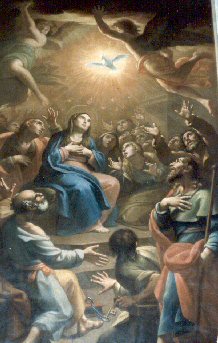 him; but you can recognize him
because he remains with you and will be within you." (John 16:17)
him; but you can recognize him
because he remains with you and will be within you." (John 16:17)
"The Paraclete, the Holy Spirit whom the Father will send in my name, will instruct you in everything, and remind you of all that I told you." (John 14:26)
We attribute the role of sanctifier to God the Holy Spirit who prompts us toward holiness in our daily choices, thus assisting us to reach our final goal – union with the Trinity when we die. Christ offered himself to God the Father in a new and eternal covenant.
What is This Covenant?
At the last supper with his disciples, (taking bread and giving thanks, he broke it and gave it to them, saying: "This is my body to be given for you. Do this as a remembrance of me." He did the same with the cup after eating, saying as he did so: "This cup is the new covenant in my blood, which will be shed for you." (Luke 22:19-20)
At Christ’s last Supper with his disciples, he announced the completion of God the Father’s eternal covenant with the human race. Satisfaction over the curse of the devil was won for us by Christ’s death and resurrection. Humankind was redeemed through this sacrifice of Christ’s humanity because he loved us so much.
Christ spoke of this final covenant between God and man when He said to his disciples,
“I myself am the living bread come down from heaven. If anyone eats this bread he shall live forever; the bread I will give is my flesh, for the life of the world.” (John 6:51)
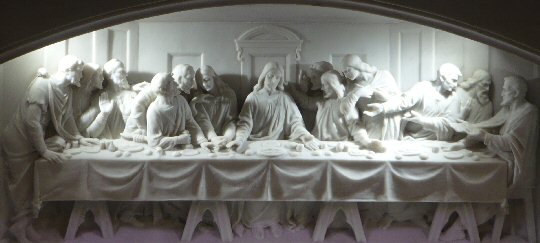 And again, " . . . if you do not eat the flesh
of the Son of Man and drink his blood, you have no life in you. He who feeds on
my flesh and drinks my blood has life eternal and I will raise him up on the
last day. For my flesh is real food and my blood real drink. The man who feeds
on my flesh and drinks my blood remains in me, and I in him. Just as the Father
who has life sent me and I have life because of the Father, so, the man who
feeds on me will have life because of me. This is the bread that came down from
heaven. Unlike your ancestors who ate and died nonetheless, the man who feeds
on this bread shall live forever.” (John 6:53-58)
And again, " . . . if you do not eat the flesh
of the Son of Man and drink his blood, you have no life in you. He who feeds on
my flesh and drinks my blood has life eternal and I will raise him up on the
last day. For my flesh is real food and my blood real drink. The man who feeds
on my flesh and drinks my blood remains in me, and I in him. Just as the Father
who has life sent me and I have life because of the Father, so, the man who
feeds on me will have life because of me. This is the bread that came down from
heaven. Unlike your ancestors who ate and died nonetheless, the man who feeds
on this bread shall live forever.” (John 6:53-58)
Some of Christ’s disciples found it hard to believe that their leader would actually accept death, and that he was telling them they must eat his flesh and drink his blood, for they imagined that he was Israel’s promised Messiah leader who would help them defeat the Romans and return Israel’s power and prestige as it had been under David, their past glorious king.
We know that covenants are based on the reliable word and agreement of both parties and sealed by the person asking or requesting the favor of the other through an offering or by giving up something he held valuable as evidence of their sincerity and good will.
Results of God's New and Eternal Covenant
Because of Christ’s covenant sacrifice, humanity would no longer be alienated from God. God the Father has reached out in love to all through His Son who offered himself to the Father for our sins. God loves us so completely and intensely that in love he allowed his Divine Son to take on our human nature. He lived among us, announced His father’s love for us, He formed His everlasting Church with its sacraments intended to strengthen us in God’s love as we carry out our earthly duties. The Sacrament of Reconciliation is the means by which our sins are forgiven.
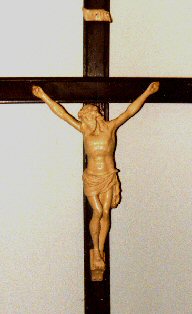 Christ’s mission showed us how much God loves as
His Son, who alone, completely satisfied the debt humanity owed to the Father.
He offered himself, suffering and dying at the hands of evil men, to remove the
punishment of the loss of Heaven, to merit for us the rewards of eternal life.
Christ’s mission showed us how much God loves as
His Son, who alone, completely satisfied the debt humanity owed to the Father.
He offered himself, suffering and dying at the hands of evil men, to remove the
punishment of the loss of Heaven, to merit for us the rewards of eternal life.
Christ did this for everyone because he loves everyone. Out of love for Christ's love, we should live our life for Him. By keeping our eyes on His cross we can only begin to grasp how great was His love for us that He would lay down His life for His friends.
This is my commandment; love one another as I have loved you. No greater love is this that one lay down one’s life for one’s friend. You are my friends if you do what I command you. (John 15:12-14)
Let’s ask God to show us opportunities to love Him and be ready to share His love with others.
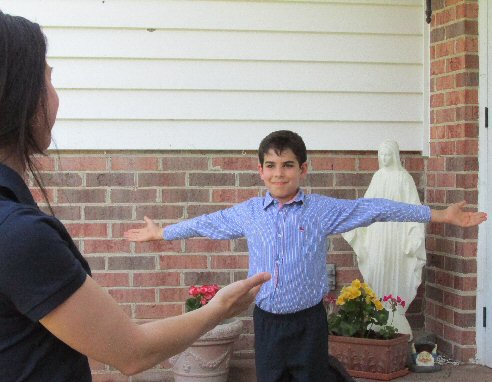 How much do you love me? A young mother once
asked her little boy.
How much do you love me? A young mother once
asked her little boy.
Without hesitation he responded by opening his arms as wide as he could and saying, "This much Mommy." His arms represented himself and their reach encompassed his world. His answer told her that his love was himself totally.
Like the boy who responded so universally to his mother's question of love, the divine Second Person of the Holy Trinity, God the Son, actualized the divine response to the willful insult made against the Divine Father by our first parents. Satisfaction for their sin took the form of a covenant promise made between God and man, whose redemption was achieved, "through a child born of a virgin.
The Lord will give you this sign; the virgin shall be with child, and bear a son, and shall name him Immanuel. (Isaiah7:14) - meaning: God with us.